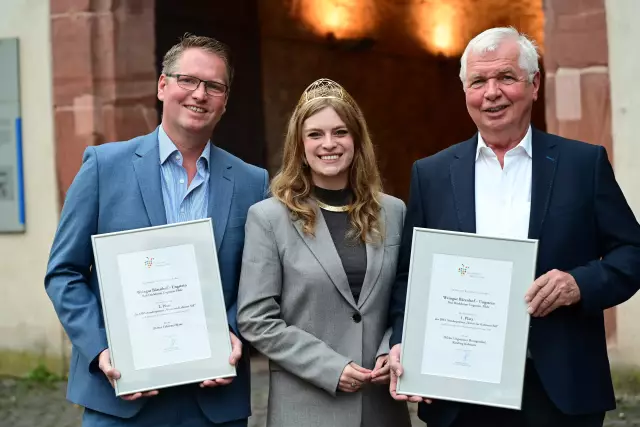Special Prize for Kabinett-Style German Wines
Light enjoyment with full flavor - this is what fruit-sweet wines with moderate alcohol content offer, which have been enjoying increasing popularity in recent years. This year, the German Wine Institute (DWI) has made these trendy wines the focus of its special prize at the DLG Federal Wine Awards.

Award winners from Germany's Pfalz and Rheinhessen Region
On August 28, Germany's Winequeen Charlotte Weihl presented the certificates to the winners of the DWI competition in Mainz. The Bärenhof winery from Ungstein in Bad-Dürkheim in the Pfalz Region took first and second place with its wines.
- 2024er Ungsteiner Honigsäckel, Riesling Kabinett vom Bärenhof
(Höchstplatzierung im Wettbewerb) - 2024er Cabernet Blanc, ebenfalls Bärenhof, Ungstein, Pfalz
- 3rd winner with same points than 2nd: 2023er Bechtolsheimer Petersberg, Riesling Kabinett, Weingut Bretz, Bechtolsheim, Rheinhessen
„Kabi-Style" is trendy
This year, only the best wines in the DLG competition with a maximum of eleven percent alcohol by volume and a residual sugar content of up to 45 grams were selected for the DWI special prize. They therefore generally correspond to wines in the classic Kabinett style, which are often simply called “Kabi” in the wine scene.
“I love Kabis,” confessed the German Wine Queen during the award ceremony. “With their invigorating freshness and fruity sweetness, they have an incredible amount of flavor with a moderate alcohol content.” In her experience, this also appeals to the younger generation.
USP for German wines
DWI spokesperson Ernst Büscher added that this type of wine is a unique selling point for German wines, with which German wine producers score points worldwide. "We are observing a growing interest in lighter wines both here in Germany and in many foreign markets. Our winegrowers here in the northern latitudes can meet this demand very well with Kabinett-style wines," emphasized Büscher.
Last year, around 21 million liters of wine with the Kabinett label were quality-tested in Germany, which accounts for around three percent of all quality and Prädikat wines. In addition, many wines without the explicit Kabinett predicate on the label also correspond to this wine style.
In addition to many established and new grape varieties, Riesling is very suitable for Kabinett-style wines. Thanks to its concise fruit acidity, Riesling still makes the wines taste harmonious and fresh despite their sweetness.
International successes
In China, German wine imports grew by eight percent last year, bucking the trend with Riesling wines in particular. Young Chinese women in particular were enthusiastic about Kabinett-style Rieslings, which are also the perfect accompaniment to Chinese cuisine.
Contact persons
-
Ernst Büscher
Press officer




